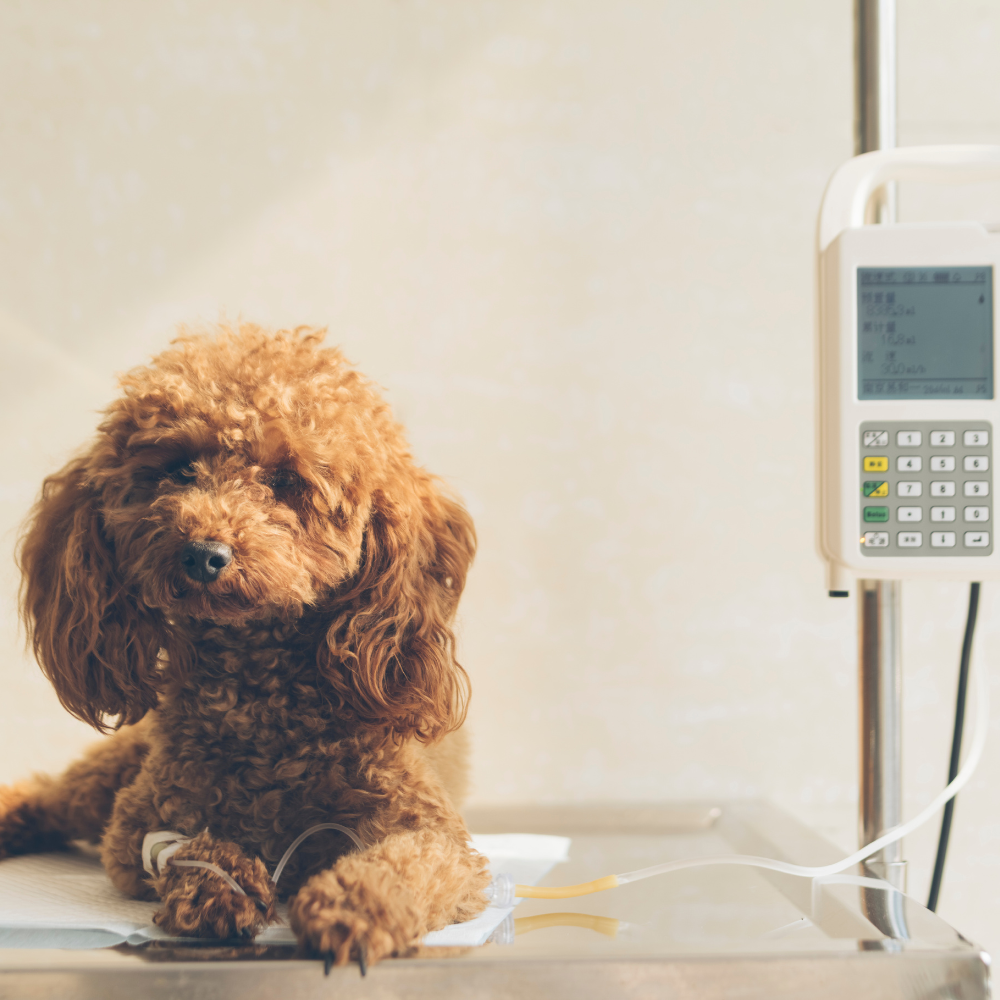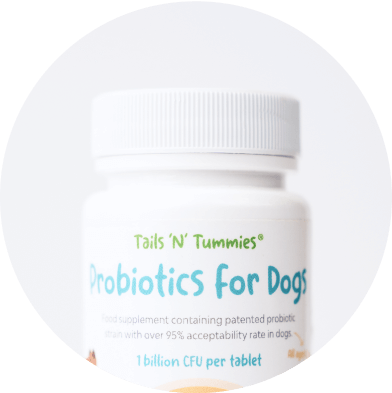Parvovirus in Dogs: Symptoms, Causes, and Treatment
Parvovirus is a highly contagious, potentially fatal disease that primarily affects young, unvaccinated puppies. We’re going to discuss what it is, how it spreads, and what the first signs of infection are. We’re also going to discuss treatment options for infected puppies, and prevention strategies for healthy ones.

Parvovirus is every puppy parent’s worst nightmare. A highly contagious viral disease affecting dogs in every corner of the world, Parvovirus is a serious tummy-centric illness that can be fatal if not treated right away. Fortunately, owners who take the time to educate themselves about this dangerous disease will have the necessary know-how to reduce their dog’s risk of infection and protect them from this harmful illness.
Today, we’ll take an in-depth look at Parvovirus in dogs - what it is, how it spreads, and where it comes from in the first place. We’re also going to talk about the best treatment options for dogs who contract this disease and steps towards successful prevention for those that have not. Let’s get started!
What is Parvovirus?
Parvovirus (“Parvo” for short) is a highly contagious viral disease that primarily affects young, unvaccinated dogs and puppies. Characterized by acute gastrointestinal distress, this disease can cause a variety of uncomfortable symptoms, such as vomiting and diarrhea, and has the potential to be deadly if left untreated. But what exactly makes this disease so dangerous? Let’s take a closer look.
What Causes Parvovirus in Dogs?
As with many other kinds of viruses, experts still aren’t 100% sure where Parvovirus comes from. This particular virus was first discovered in Europe in 1976, and by 1978, it had developed into a worldwide epidemic. For some time, Parvo was thought only to affect domestic dogs, but we have since learned that it is capable of affecting wild dogs (such as coyotes and wolves), as well as other wild animals, including foxes, raccoons, and skunks.
The behavior of Parvovirus closely replicates that of a feline-specific virus known as Feline Panleukopenia Virus (FPV). FPV was first recognized in 1920, and though cats are the only at-risk species for this disease, many believe that Parvovirus is derivative of FPV.
A recent publication from the Baker Institute for Animal Health at Cornell summarized this theory by stating that “(Parvovirus) probably arose as the result of 2 or 3 genetic mutations in FPV that allowed it to expand its host range to infect dogs.”
Risk Factors of Parvovirus
Parvovirus can affect unvaccinated dogs of any age, though studies show that it most commonly affects young puppies between six and twenty weeks. Due to their lack of protection against this tummy-turning disease, young puppies who have not yet achieved full vaccination status are especially vulnerable.
While age and vaccine status are two of the biggest factors in susceptibility, many pet owners are surprised to learn that breed can also have an impact. According to the Merck Veterinary Manual, all five of the following breeds are considered high-risk for Parvovirus:
- Rottweilers
- Doberman Pinschers
- American Pit Bull Terriers
- English Springer Spaniels
- German Shepherds
How Does Parvovirus Spread in Dogs?
Parvovirus is one of the most resistant infectious diseases known to man. Not only can it be spread through direct contact with an infected dog’s feces, but it can also be contracted through shared objects and surfaces (including bowls, toys, leashes, and kennels). This disease is incredibly hard to get rid of as it can live in the environment for up to five months without a host and is resistant to heat, cold, humidity, and dry weather. Parvo can even be spread through the hands and clothing of people who interact with an infected dog!
Parvovirus Symptoms in Dogs
Because many of the symptoms of Parvovirus are similar to that of an upset tummy, things may not seem overly threatening at first. But be mindful - Parvovirus can quickly turn into a medical emergency before you know it! Some of the most common signs and symptoms of Parvovirus in dogs may include:
- Vomiting
- Diarrhea (often tinged with blood)
- Loss of appetite
- Lethargy or decreased energy
- Fever (high body temperature) or hypothermia (low body temperature)
- Abdominal pain and bloating
Due to these symptoms, dogs with Parvovirus are at serious risk for rapid dehydration and intestinal damage. In addition, this condition may also weaken the immune system significantly, which puts a dog at risk for septic shock (a body-wide infection).
The secondary problems caused by the symptoms mentioned above can be fatal if not treated efficiently. In fact, according to the American Veterinary Medical Association, most deaths from Parvovirus occur within 48 to 72 hours following the onset of clinical signs.
Diagnosing Parvovirus in Dogs
When it comes to Parvovirus, early detection is key. And the best resource to help diagnose this potentially-fatal disease? Your veterinarian!
Your veterinarian will likely recommend immediate testing if your puppy shows clinical signs of Parvovirus. To do this, your veterinary staff will obtain a small sample of your pup’s stool and insert it into a specific testing device (such as the Parvo SNAP Test from IDEXX).
Typically, in-house testing for Parvovirus only takes a few moments. However, your veterinarian may also recommend a few secondary tests be performed, such as an intestinal parasite screening or bloodwork (to ensure your pup’s internal organs are functioning properly).
Parvovirus in Dogs Treatment
Parvovirus is a disease without a cure that must be allowed to run its course. However, there are many things that pet owners can do to provide supportive care. In most cases, this involves hospitalizing your pet so that they can receive the care they need, which may include:
- IV Fluid Therapy (to prevent dehydration)
- Antibiotics (to rid the body of secondary infections)
- Anti-Nausea Medication (to prevent nausea and vomiting)
- Appetite Stimulants (to restore appetite)
Left untreated, Parvovirus is a fatal disease that most dogs won’t survive on their own. However, according to the Merck Veterinary Manual, most puppies who survive the first three-to-four days of illness will fully recover. If treated appropriately and with haste, Parvovirus has a 70-90% survival rate - and most dogs who recover will enjoy lifetime immunity to reinfection.
Preventing Parvovirus in Dogs
The best way to prevent Parvovirus is to ensure that your puppy receives all necessary vaccinations, as most puppies will require several boosters of the Parvo vaccine. These shots are typically paired with the Distemper vaccine and should be given between eight and sixteen weeks of age.
Until the puppy has achieved full vaccination status, owners should be careful to keep him away from other animals (particularly those dogs who are unknown or unvaccinated) and from dog parks, pet stores, and boarding, grooming, or daycare facilities.
In addition, owners should use caution when determining where the puppy goes to potty, walk, and play. After all, Parvovirus is a contact disease that can easily be spread through grass, greenery, and other inconspicuous surfaces.
As a dog ages, they will typically only require a once-yearly Parvo booster. This shot can be given during your dog’s annual visit, though some veterinarians may also give you the option of receiving a three-year vaccine.
FAQs About Parvovirus in Dogs
“Can humans get Parvovirus?”
While there is no evidence to support the idea that Parvovirus can be spread to humans, it can certainly be spread through humans! Because Parvo is a contact disease, it can easily be spread through the hands or clothing of a person who has interacted with an infected dog. For this reason, washing your hands and clothing thoroughly after loving on your sick pup is crucial!
“If my breeder has already given my puppy his first vaccines, do I really need to continue them at the vet?”
The short answer to this question is a resounding YES! When it comes to puppy vaccines, the number of vaccines your puppy receives is less important than the timing in which he receives them. Because an average puppy’s immune system takes several weeks to develop fully, it is imperative to ensure these core vaccines are received during each phase of growth.
“How long is a dog with Parvovirus contagious?”
Infected dogs will shed the disease in their stool for up to two weeks following the onset of clinical symptoms. During this time, pet owners need to be diligent in disposing of their pup’s stool appropriately, which may include bleaching the grass or paved areas on which your pet poos!
“How common is Parvovirus in dogs?”
According to Dr. Michael Hung of TAMU’s College of Veterinary Medicine, “Parvovirus is the world’s most common canine infectious disease.” And while there aren’t many available resources for statistical data, research tells us that no young, unvaccinated dog is safe from this dangerous illness.
“Can my puppy get Parvovirus more than once?”
Unlike other common canine illnesses, such as Kennel Cough, Parvovirus is unlikely to be contracted more than once by the same dog. Puppies who survive Parvo will likely enjoy long-term (possibly lifetime) immunity to this dangerous disease.
“What is the prognosis for Parvovirus?”
The prognosis for dogs infected with Parvovirus can vary greatly depending on the approach taken in treatment. Most dogs who receive treatment for Parvo will fully recover, with survival rates in the 70-90th percentile. However, without appropriate treatment (or any treatment at all), the odds are fifty-fifty. Adult dogs that have been properly vaccinated may show milder symptoms of the virus and generally have better survival rates.
Conclusion
Parvovirus is a serious and highly contagious disease that can affect puppies of any gender, breed, or size. By understanding how this progressive illness spreads, the symptoms, treatment options, and the best ways to prevent Parvovirus, you can help keep your puppy safe. If you have any questions about Parvo or think your puppy may be at risk, please reach out to your veterinarian right away.
Boost Their Gut Health with Probiotics for Dogs
Facing digestive issues in your furry friend? Our Probiotics for Dogs is a blend aimed at enhancing gut health, boosting nutrient absorption, and promoting overall wellness. Dive into a world where your dog’s tummy troubles are eased. Your beloved companion deserves a life of comfort and vitality. Discover the benefits today.
Shop Probiotics